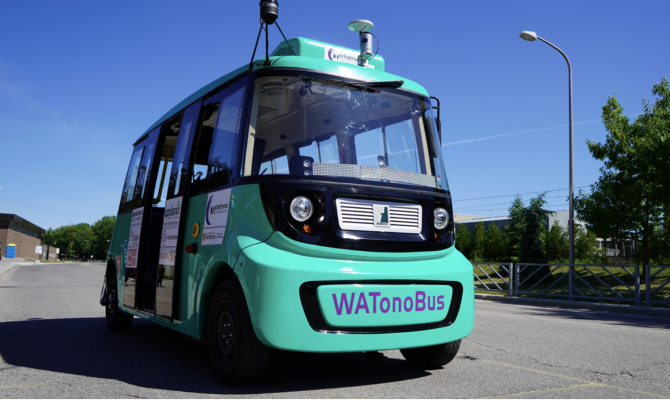
U of Waterloo launches Canada’s first autonomous 5G shuttle
EP&T Magazine
Automation / Robotics Electronics Engineering Software Engineering AI automotive autonomous education engtineering vehiclesVehicle marries transformational research, infrastructure and a network of industry and government partnerships
The University of Waterloo is showcasing the operation of a driverless, autonomous shuttle research program that will transport students and staff around campus. The demonstration of the shuttle, dubbed ‘WATonoBus’ by the research team, is the first of its kind at a Canadian academic institution and marks a significant milestone in a multi-year initiative to demonstrate and integrate autonomous transportation onto the campus.
This milestone features another significant technological advancement, as the shuttle becomes the first in the country to operate remotely over Rogers 5G network, thanks to a partnership agreement with the University to advance 5G research in the Toronto-Waterloo tech-corridor.

Source: University of Waterloo
The shuttle’s 5-stop, 2.7-kilometre journey around the Waterloo main campus, intersecting with the campus light rail transit stop, holds the potential to help reshape how entire communities move around their urban spaces.
“We are thrilled not only about WATonoBus, but what it represents,” said Feridun Hamdullahpur, president and vice-chancellor of the University of Waterloo. “By marrying transformational research, infrastructure and a network of industry and government partnerships, we are demonstrating that educational institutions will help shape the future – in this case, the convergence of public transportation and smart urban mobility.”
20 researchers in Mechatronic Vehicle Systems lab
The driverless shuttle with remote takeover capability will showcase a full-system approach, developed entirely at the University of Waterloo, led by Professor Amir Khajepour and a team of over 20 researchers in the Mechatronic Vehicle Systems Laboratory. Funding support has been provided by federal and provincial partners, as well as contributions from Applanix, RoboSense AI, and Rogers to make WATonoBus a reality.
The technology includes an integrated on-board sensor system providing vehicle intelligence and control; a suite of front, rear and side cameras providing a 360-degree view; light detection and ranging (LIDAR) active remote sensing systems used for detecting objects; and a WATonoBus smartphone app to help passengers navigate the campus using the shuttle.
Exciting step forward in autonomous
“Today’s demonstration represents over four years of work with support and collaboration with government and industry partners,” Khajepour said. “This is an exciting step forward in autonomous, driverless public transportation.”
And, for the first time in Canada, an autonomous shuttle will be operated entirely on a remote basis using a 5G network. The modem on board will communicate through the Rogers 5G network with a research lab-based control centre. In the control centre, a remote operator will monitor the WATonoBus operations, and take over control when needed to ensure safe movement.
Drive Canada’s digital economy forward
“As real-world 5G use cases such as the WATonoBus begin to take shape, we are starting to see the potential of 5G come to life,” said Jorge Fernandes, Chief Technology Officer at Rogers Communications. “Smart cities and smart transportation solutions are poised to help make cities safer, more efficient and more environmentally friendly. This example of 5G innovation demonstrates the importance of fostering 5G research and development to help fuel industries and drive Canada’s digital economy forward. We are proud to help enable this important 5G moment as part of our partnership with the University of Waterloo.”
The demonstration is the latest step of a multi-year initiative that is creating a testbed to evaluate automated driving on campus. Future industry partnerships will add more elements of a smart city on campus, a living testbed for advanced research, product development and data collection.
Funding initiatives
Before commencing operation as a regular service, the driverless shuttle system requires approval from the Ontario Ministry of Transportation (MTO). Currently, the University of Waterloo is a registered participant in Ontario’s Automated Vehicle Pilot Program, which permits testing of driverless AVs on Ontario roads.
Federal and provincial funding for the WATonoBus project has been provided through the Canadian Foundation for Innovation, the Ontario Research Fund and the Natural Sciences and Engineering Research Council.
